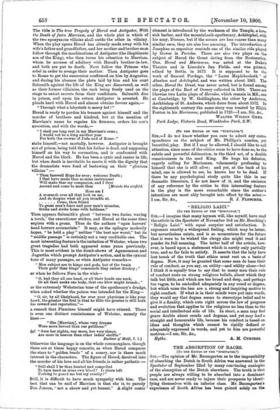" RELIGIO LAICI."
[To THE EDITOR OF THE "SPECTATOR."]
SIR,—I imagine that many laymen will, like myself, have read the article in the Spectator of November 3rd on Mr. Beechinga
Religio Laici " with equal surprise and satisfaction. It expresses exactly a widespread feeling, which may be latent, but nevertheless exists, and is so momentous for the future that it were to be wished the clergy also might read it and ponder its full meaning. The latter half of the article, how- ever, is based upon a statement which is surely only partially true, and so far fails to satisfy. It asserts that the laity have lost touch of the truth that ethics must rest on a basis of dogma. Now, it may be granted that some men do base their rule of conduct, as you say, on utility—and utility alone—but I think it is equally true to say that to many men their rule of conduct rests on strong religious beliefs, about which they talk but little, and which are too broad and deep, and perhaps too vague, to be embodied adequately in any creed or dogma, but which none the less are a strong and inspiring motive to right conduct. If what is in their minds were put into words, they would say that dogma seems to stereotype belief and to give it a fin nlity, which cuts right across the law of progress and evolution that applies to the religious no less than to the social and intellectual side of life. In short, a man may feel grave doubts about creeds and dogmas, and yet may lead a straight and honourable life, because his conduct is based on ideas and thoughts which cannot be rigidly defined or adequately expressed in words, and yet to him are powerful motives.—I am, Sir, &c.,






































 Previous page
Previous page